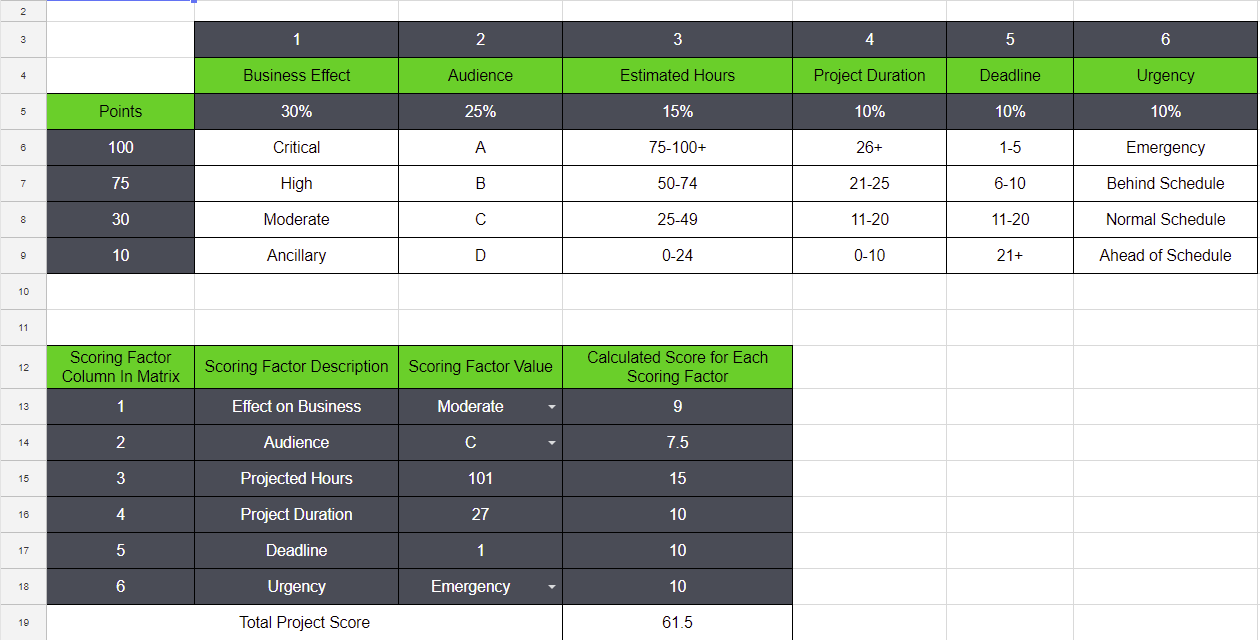When you work in marketing, you learn very quickly: there is always more work to be done. New work is pouring in every day, and high priority campaigns are replaced with pressing initiatives that need to be done ASAP. Hurry hurry hurry! You’ve got to strike while the iron is hot or risk losing your window of opportunity.
Not only is it exhausting to be so reactive, it’s difficult to keep new priorities straight — and even more difficult to know what you should focus on when you’ve got a dozen initiatives and they’re all mission-critical. How do you choose the right mix of projects that will have the greatest impact on company success?
Use these steps to prioritize your marketing campaigns and decide which projects should be the focus of your team’s time and resources.
Separate To-dos From "Someday" Projects

In order to get a workable list of campaigns and initiatives to prioritize, you first need to narrow your focus. Consider which tasks are a priority for project success, and which are out of scope (if you’re wondering what does out of scope mean in project management, it simply means anything that is outside the parameters of the project). Move the "someday" projects and loosely defined ideas to another list or folder in your work management tool so you don’t lose them, but they don’t overwhelm your brain and cloud your current priorities.
Just remember to visit (and spruce up) the someday list every month or every two weeks to remind yourself they exist and there are still some worthwhile ideas in there.
Understand Your Goals
Knowing exactly what you want to accomplish is essential for understanding which projects will help you get there. Instead of reacting to competitor campaigns or following the same strategies you’ve relied on for years, take a good look at your company’s quarterly OKRs and strategic goals. Which campaigns will help you achieve them? Cut or postpone any projects that don’t directly correlate with those goals.

Understand ROI
You need to understand the actual demands on your team’s time and your company’s resources in order to make smart decisions about which campaigns to prioritize, and to keep your team from becoming so rushed and overwhelmed that they can’t do their best work.
It all boils down to answering these questions:
- What kind of revenue will the project generate for the company?
- What are the costs involved?
- What resources are required in terms of time dedication for creative team members, equipment, etc.?
- What other projects will need to be postponed in order to meet the deadline?
- What risks are involved, if any?
Use Metrics & Data to Set Priorities
You can “score” projects based on different criteria: target audience, projected hours, expected effect on the business, etc., and then use those values to calculate a priority score for each project. More points = higher priority.
For instance, a campaign that targets your ideal customer A, with a deadline in 3 weeks, that requires 15 hours of work would score more points and be given a higher priority than a project that targets customer B, would launch in 6 weeks, and requires only 6 hours of work.
Here’s a sample marketing prioritization scorecard on a Google Sheet that you can make a copy of and use to score your own campaigns.

Set a Time Limit
Even once you have all the relevant information, it’s easy to discuss, scrutinize, and evaluate until you’re paralyzed by over-analysis. Instead, set a timer and give your team 20 minutes to make a decision about project importance. You’ll be forced to look only at the key facts and actually make a concrete decision about where the campaign in question lies among your current priorities and how it furthers organizational goals.
Align Your Team Around Top Priorities
By combining these campaign prioritization strategies with a work management and collaboration tool like Wrike, you’ll be able to identify marketing initiatives that further your business strategy, get your team collaborating efficiently on the most important projects, and analyze each campaign’s impact on your bottom line.
Start a free 2-week trial of Wrike today, with nothing to download or install.
More Marketing Tips & Resources




